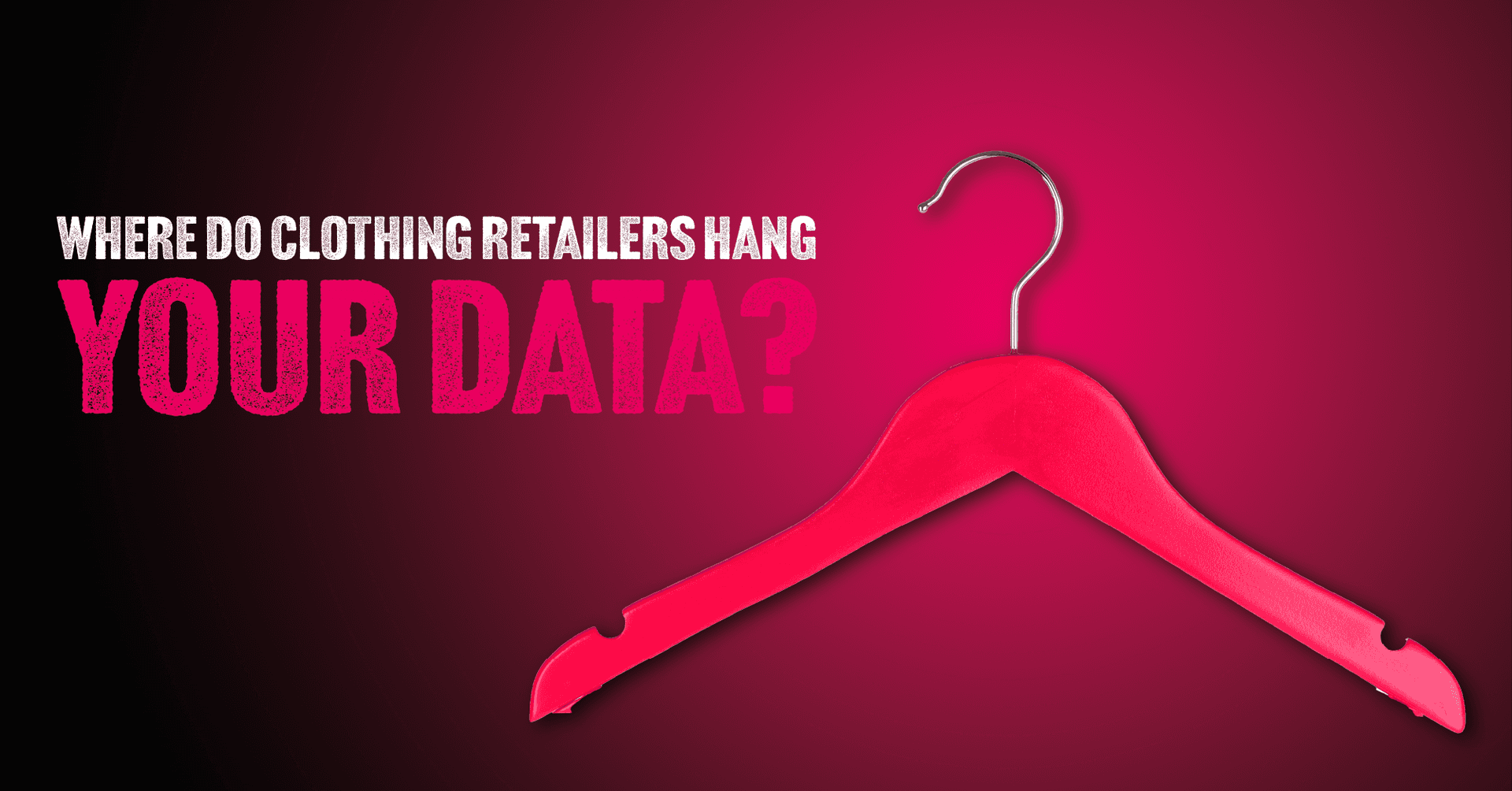- Protect
- Blog
What do clothing retailers do with personal data?
Online clothing retailers collect a lot of personal data from consumers. And then they often share it or even sell it to all manner of organisations that you may not even have heard of. So what data are they collecting and should you worry about it?By Rightly
4 min read

Clothing retailers, like many other businesses, collect and use personal data for various purposes related to their operations, marketing, and customer service. The specific use of personal data can vary based on the retailer's business model, policies, and the applicable laws and regulations. Here are common ways clothing retailers use personal data:
- Customer transactions and orders: Personal data such as name, address, email, and payment information are collected to process orders and transactions
- Customer accounts and profiles: Retailers create customer profiles to provide personalised shopping experiences and manage loyalty programs
- Marketing and promotion: Retailers use personal data to send marketing communications, promotions, newsletters, and advertisements based on customer preferences and purchase history
- Customer service: Personal data helps retailers address customer inquiries, concerns, and complaints efficiently. It is also used to manage product returns and exchanges
- Product recommendations: Retailers use data analysis to suggest products based on a customer's purchase history and browsing behaviour.
- Website and app optimisation: Retailers analyse user data to optimise website and app performance, improve user experience, and tailor content and offers
- Market research and analytics: Retailers use personal data to conduct market research, analyse trends, and identify customer preferences to inform business strategies
- Fraud prevention and security: Personal data is utilised to detect and prevent fraudulent activities, aiming to keep it a secure shopping experience for customers
- Compliance with legal requirements: Retailers collect and maintain personal data as required by law, including tax regulations, consumer protection laws, and anti-money laundering regulations
- Third-party partnerships and collaborations: Retailers may share personal data with trusted partners, such as payment processors, for transaction processing and fulfilment.
- Customer feedback and reviews: Retailers may request customer feedback and reviews, using personal data to improve products and services.
It's important for clothing retailers to handle personal data in a transparent and compliant manner, respecting customers' privacy rights and ensuring data security. Many countries and regions have specific data protection laws, such as the European Union's General Data Protection Regulation (GDPR) that outlines how personal data should be handled, stored, and shared. Compliance with GDPR regulations is crucial for retailers to maintain trust and legal compliance.
Shopping for clothes online rather than in person has exploded exponentially. Whilst putting pressure on High Street operations, going online is fast, often cheaper with more variety and (perhaps most importantly) you can do it from wherever you are, avoiding dreary travel in uncertain weather.
The retailers capture as much data as they can and they put cookies on your computer every time you click ‘accept’ on their website that track your activity, not just with them, but where else your browsing takes you.
So what are all these clothing retailers doing with the data they collect from you? From every add to your wish list, basket or payment, you might be surprised at how much data they collect on you and how much of that information they sell or share with third parties. The ways they use data can be surprising, such as knowing your clothing size and inferring your profession and salary from the clothes you buy being valuable to advertisers.
By reading through the privacy policies of online clothing retailers, you might find some of their practices alarming. But unfortunately you’ve legally consented to them. However, most sites have an option for you to opt out - and Rightly Protect can enable you to get all your data deleted by any organisation.
Amazon to Zara
Whoever it is from Amazon to Zara, they all collect a range of data whenever they can. So what data do they collect on you? Some examples of the data clothing retailers collects on you may include:
- Name
- Addresses
- Age
- Gender
- Location
- Voice recordings and interactions with Alexa (Amazon)
- Credit history and information
- Your interactions with any ‘subsidiaries’
- Search results and links, including paid listings e.g. sponsored links or information about your internet-connected devices
- Any information you provide via a web form or participate in online community
- Dress size
- Your estimated price range
- Order history
- Search history
- Styles you like
- Social media accounts and how you might share your likes with your friends and how you might influence others with your style
- Browser type and version
- Weblogs and other communication data
- IP address
- Cookie data
- Credit card details
- Bank details
- Credit score
- Weight, height, and body measurements
Do they share your data?
In general, yes they do. H&M claim that they don’t. Customer information is used for targeted advertising. Although some privacy policies say they don’t ‘sell’ your data, they do share it, sometimes for money… sounds like ‘selling’ don’t you think?
Who with?
Sometimes your data gets shared direct and sometimes through data brokers, the retailers share it with advertisers, publishers, social media networks, search engines, marketing agencies, ad serving companies, and advertising companies working on their behalf and so on.
Some retailers say that before they share your data they will make sure that it doesn’t identify you. Although this is very good practice, unfortunately data can easily be de-anonymised.
The retailers use a variety of analytics and targeted advertising tools in order to serve ‘relevant’ ads to you on other websites and apps. For example, if you click to view a yellow pair of shoes on the Boohoo site, then move on to read an online article on a different site next without buying them, an ad for those yellow shoes might pop up on the side of the site you’re now on.
Get your data back
If your data is held by a retailer, apart from not knowing where they might share it, it can be stolen by hackers if they’re able to break into the organisation’s systems. If they get your data, you can become vulnerable to scams and even identity theft. So the best way to prevent that is to get your data deleted from the company’s systems long before a hacker can get to it. Rightly Protect is our product that can help you find out which companies have your data and then get it deleted from those that don’t need it any more, quickly and for free.
Related Articles
- Blog
7 min read

How protected is your data
In 2018, the Data Protection Act was effectively the UK’s implementation of the EU’s General Data Protection Regulation, designed at its heart to protect consumers’ personal data, as well as govern how data is handled by organisations. The Act has been a valuable tool to give consumers control of their data. Should government proposals for new legislation easing the grip of GDPR be of concern?
- Blog
4 min read

Breaches of 2022
2022 saw more data breaches than ever. Take a look at just ten examples. And think about how you can minimise the risk of your data appearing in a hack that could make you vulnerable to scams.